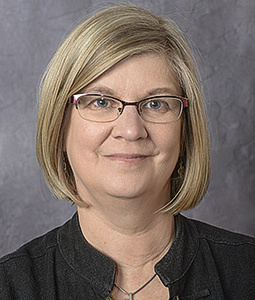Department of Geography
Directory
Kirstin Dow
| Title: | Distinguished Professor Emerita |
| Department: | Geography College of Arts and Sciences |
| Email: | KDow@sc.edu |
| Phone: | 803-777-2482 |
| Office: | Callcott, Room 325 |
| Resources: |

Bio
Dr. Kirstin Dow is a professor in the Department of Geography, earning her Ph.D. from Clark University, and joining the South Carolina faculty in 1996. She is a social environmental geographer focusing on understanding climate impacts, vulnerability, and adaptation.
Dow serves as principal investigator of the Carolinas Integrated Sciences and Assessments (CISA). The CISA team conducts research in North Carolina and South Carolina that integrates climate information into water, health and coastal management and decision making. The CISA team is hosting the 4th Carolinas Climate Resilience Conference in October 2020. Currently, Kirstin is a member of NOAA’s Science Advisory Board, Climate Working Group and a lead author on the Southeast Chapter for the Fourth US National Climate Assessment (expected Dec. 2018).
Kirstin was named as Fellow to the 2016 inaugural class of AAAS Leshner Leadership Institute Public Engagement with Science. She has also engaged public concerns as a lead author on the Intergovernmental Panel on Climate Change (IPCC) Fifth Assessment, Working Group 2 report and author on the IPCC Summary for Policy Makers. Dow is co-author of The Atlas of Climate Change, a seminal work published in ten languages. Kirstin is also a science advisor on climate change mitigation and adaptation for community and national efforts. She has also served as a lead author of a special report on recommendations for establishing a sustained US National Climate Assessment capability and a lead author on the Southeast chapter in the US National Climate Assessment 2018. Other publications on climate change, impacts, and adaptation have appeared in Nature Climate Change, Sustainability, Journal of Environmental Assessment Policy and Management, Natural Hazards, Global Environmental Change, Journal of the American Water Resources, and Geography Compass.
Specialization
- Climate impacts, adaptation, and vulnerability
Research
I am interested in the co-production of science to inform decision-making climate change, impacts, vulnerability, and adaptation. I work primarily with a large interdisciplinary research team, the Carolina Integrated Sciences and Assessments (CISA), one of the 11 NOAA-supported Regional Integrated Sciences and Assessments projects. CISA addresses climate connections to public health, coastal, and water resources management. My current research projects focus on understanding limits to adaptation, the role of social networks increasing adaptive capacity, and analytical-deliberative processes for adaptation.
Teaching
- GEOG 103: Introduction to Geography
- GEOG 343: Human Impact on the Environment
- GEOG 566: Environmental Aspects of Planning and Management: Focus on Climate Change
- GEOG 568: Human Dimensions of Global Environmental Change
Representative Publications
Books
K. Dow and T.E. Downing. 2006; 2nd edition, 2007; 3rd edition, 2011. The Atlas of Climate Change. U.S. Edition: University of California Press, Berkeley, CA; UK Edition: Earthscan,
London, UK. Online. Foreign language versions are also available in German, Greek,
Italian, Japanese, Korean, Portuguese, and Thai.
Edited Books
Adam Parris, Gregg Garfin, Kirstin Dow, Ryan Meyer, and Sarah L. Close, eds. April
2016. Climate in Context: Science and Society Partnering for Adaptation. John Wiley and Sons: AGU.
K.T. Ingram, K. Dow, L. Carter, and J. Andersen, eds. 2013. Climate of the Southeast United States: Variability, Change, Impacts, and Vulnerability. Island Press, Washington.
Book Chapters
Moser, S., K. Dow, and S.P. Tuler. 2017. Out of Harm's Way: Challenges in Reducing
Current and Future Coastal Risk Exposure. In Kasperson, R. E. ed. Risk Conundrums: Solving Unsolvable Problems. Earthscan, London. Pp. 189-206.
Tuler, S.P., K. Dow, and T. Webler. 2017. How Can We Learn More From Learning About Risk Controversies. In Kasperson, R.E. ed. Risk Conundrums: Solving Unsolvable Problems. Earthscan, London. Pp. 62-74.
Tuler, S., K. Dow, T. Webler, and J. Whitehead. 2016. Learning through participatory modeling: Reflections on what it means and how it is measured. In S. Gray, M. Paolisso, and R. Jordan, eds. Environmental Modeling with Stakeholders. Springer. pp. 25-46.
Refereed Journal Articles
Buizer, J., K.Dow, et al. 2016. Building a Sustained Assessment Process. Climate Change.
DOI 10.1007/s10584-015-1501-4
K. Lackstrom, N. Kettle, B. Haywood, and K. Dow. Climate-Sensitive Decisions and Time Frames: A Cross-Sectoral Analysis of Information Pathways in the Carolinas. Weather, Climate, and Society. http://dx.doi.org/10.1175/WCAS-D-13-00030.1
K. Dow, F. Berkhout, and B.L. Preston. 2013. Limits to Adaptation to Climate Change: A Risk Approach. Current Opinion in Environmental Sustainability 5:384–391.
B. Haywood, N. Kettle, K. Lackstrom, and K. Dow. 2013. Negotiating a Mainstreaming Spectrum: Climate Change Response & Communication in the Carolinas. Journal of Environmental Policy & Planning 13(1) doi:10.1007/s10113-013-0440-8.
K. Dow, F. Berkhout, B. Preston, R. Klein, G. Midgley, and R. Shaw. 2013. Limits to Adaptation. Nature Climate Change 3 (April): 305-307; doi:10.1038/nclimate1847.
B.L. Preston, K. Dow, and F. Berkhout. 2013. The Climate Adaptation Frontier. Sustainability 2013 (5): 1011-1035; doi:10.3390/su5031011.
K. Dow, B. Haywood, N. Kettle, and K. Lackstrom. 2013. The Role of Ad Hoc Networks in Supporting Climate Change Adaptation: A Case Study from the Southeastern United States. Regional Environmental Change 13(1), doi:10.1007/s10113-013-0440-8.
B.L. Preston, K. Dow, and F. Berkhout. 2013. The Climate Adaptation Frontier. Sustainability 2013 (5): 1011-1035; doi:10.3390/su5031011.
K. Dow, B. Haywood, N. Kettle, and K. Lackstrom. 2013. The Role of Ad Hoc Networks in Supporting Climate Change Adaptation: A Case Study from the Southeastern United States. Regional Environmental Change 13(1), doi:10.1007/s10113-013-0440-8.